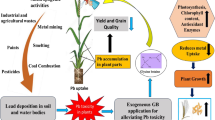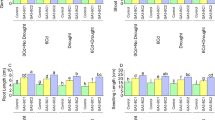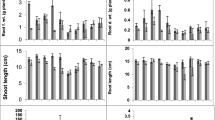Abstract
The toxicity of lead (Pb) in agricultural soil is constantly increasing as a result of anthropogenic activities. Pb is one of the most phytotoxic metals in soil that accumulates in plant tissue, resulting in yield loss. It is currently becoming more popular to supplement glycine betaine (GB) for Pb-induced stress tolerance in crop plants. Currently, no report describes the use of GB as a stress mitigator for growth attributes and stress-specific biomarkers in barley plants under Pb stress conditions. Hence, the present research was designed to examine the stress-mitigating behavior of GB on various growth attributes including germination percentage, seed vigor index (SVI), radicle length, plant biomass (fresh and dry), shoot and root length, physiological attributes such as relative water content (RWC), and stress-specific biomarkers like electrolyte leakage (EL), and H2O2 content of two barley varieties viz. BH959 and BH946 at three Pb stress treatments (15 mM, 25 mM, and 35 mM), with and without GB (2 mM) supplementation in natural conditions. The present investigation showed that at the highest Pb stress (35 mM), the germination rate was reduced to zero, and the growth attributes and RWC of both barley varieties were also reduced as compared to the non-stressed plants (control) with an increase in Pb treatment. However, EL up to 70% and H2O2 content up to 30% increased with an increase in Pb stress concentration indicated by ROS accumulation, resulting in more oxidative stress. Additionally, GB application alleviated the toxic effect of Pb stress by improving the rate of germination by 33.3% and growth performance by reducing the ROS accumulation in terms of reducing stress biomarkers H2O2 by 25%, and EL by 12%. It has been revealed that the application of GB can minimize or reduce the toxic effects caused by Pb toxicity in both varieties, positively modulating plant growth performances and lowering oxidative stress. This research may provide a scientific basis for assessing Pb tolerance in barley plants and developing alternative approaches to protecting them from the severe effects of Pb toxicity.
Graphical Abstract















Similar content being viewed by others
Data availability
Data is available from AS on reasonable request.
References
Ahada CP, Suthar S (2017) Hydrochemistry of groundwater in North Rajasthan, India: chemical and multivariate analysis. Environ Earth Sci 76(203):1–6. https://doi.org/10.1007/s12665-017-6496-x
Ahmad R, Ali S, Abid M, Rizwan M, Ali B, Tanveer A, Ahmad I, Azam M, Ghani MA (2020) Glycinebetaine alleviates the chromium toxicity in Brassica oleracea L. by suppressing oxidative stress and modulating the plant morphology and photosynthetic attributes. Environ Sci Pollut R 27(1):1101–1111. https://doi.org/10.1007/s11356-019-06761-z
Ali S, Chaudhary A, Rizwan M, Anwar HT, Adrees M, Farid M, Irshad MK, Hayat T, Anjum SA (2015) Alleviation of chromium toxicity by glycinebetaine is related to elevated antioxidant enzymes and suppressed chromium uptake and oxidative stress in wheat (Triticum aestivum L.). Environ Sci Pollut R 22(14):10669–10678. https://doi.org/10.1007/s11356-015-4193-4
Ali S, Farooq MA, Hussain S, Yasmeen T, Abbasi GH, Zhang G (2013) Alleviation of chromium toxicity by hydrogen sulfide in barley. Environ Toxicol Chem 32(10):2234–2239. https://doi.org/10.1002/etc.2309
Alkhatib R, Mheidat M, Abdo N, Tadros M, Al-Eitan L, Al-Hadid K (2019) Effect of lead on the physiological, biochemical and ultrastructural properties of Leucaena leucocephala. Plant Biol 21(6):1132–1139. https://doi.org/10.1111/plb.13021
Alsaeedi A, El-Ramady H, Alshaal T, El-Garawani M, Elhawat N, Al-Otaibi A (2018) Exogenous nanosilica improves germination and growth of cucumber by maintaining K+/Na+ ratio under elevated Na+ stress. Plant Physiol Biochem 125:164–171. https://doi.org/10.1016/j.plaphy.2018.02.006
Ashraf MA, Rasheed R, Hussain I, Iqbal M, Farooq MU, Saleem MH, & Ali S (2022) Taurine modulates dynamics of oxidative defense, secondary metabolism, and nutrient relation to mitigate boron and chromium toxicity in Triticum aestivum L. plants. Environ Sci Pollut R 29(30):45527–45548. https://doi.org/10.1007/s11356-022-19066-5
Bali S, Jamwal VL, Kaur P, Kohli SK, Ohri P, Gandhi SG, Bhardwaj R, Al-Huqail AA, Siddiqui MH, Ahmad P (2019) Role of P-type ATPase metal transporters and plant immunity induced by jasmonic acid against lead (Pb) toxicity in tomato. Ecotox Environ Safe 174:283–294. https://doi.org/10.1016/j.ecoenv.2019.02.084
Bharwana SA, Ali S, Farooq MA, Iqbal N, Hameed A, Abbas F, Ahmad MSA (2014) Glycine betaine-induced lead toxicity tolerance related to elevated photosynthesis, antioxidant enzymes suppressed lead uptake and oxidative stress in cotton. Turk J Bot 38(2):281–292. https://doi.org/10.3906/bot-1304-65
Biju S, Fuentes S, Gupta D (2017) Silicon improves seed germination and alleviates drought stress in lentil crops by regulating osmolytes, hydrolytic enzymes and antioxidant defense system. Plant Physiol Biochem 119:250–264. https://doi.org/10.1016/j.plaphy.2017.09.001
Blake T, Blake VC, Bowman JG, Abdel-Haleem H (2010) Barley feed uses and quality improvement Barley: Production, Improvement and Uses. Wiley-Blackwell, New Jersey, pp 522–531
Bohnert HJ, Jensen RG (1996) Strategies for engineering water-stress tolerance in plants. Trends Biotechnol 14(3):89–97. https://doi.org/10.1016/0167-7799(96)80929-2
Chen Z, Yang B, Hao Z, Zhu J, Zhang Y, Xu T (2018) Exogenous hydrogen sulfide ameliorates seed germination and seedling growth of cauliflower under lead stress and its antioxidant role. J Plant Growth Regul 37(1):5–15. https://doi.org/10.1007/s00344-017-9704-8
De Maria S, Puschenreiter M, Rivelli AR (2013) Cadmium accumulation and physiological response of sunflower plants to Cd during the vegetative growing cycle. Plant Soil Environ 59: 254–261. https://doi.org/10.17221/788/2012-PSE
Dionisio-Sese ML, Tobita S (1998) Antioxidant responses of rice seedlings to salinity stress. Plant Sci 135(1):1–9. https://doi.org/10.1016/S0168-9452(98)00025-9
Duhan SS, Khyalia P, Solanki P, Laura JS (2023) Uranium Sources, Uptake, Translocation in Soil-Plant System and its Toxicity in the Plants and Humans: A Critical Review. Orient J Chem 39(2):303–319. https://doi.org/10.13005/ojc/390210
Duhan SS, Khyalia P, Laura JS (2022) A comprehensive analysis of health risk due to natural outdoor gamma radiation in southeast Haryana, India. Curr Sci 123(2): 169–176. https://doi.org/10.18520/cs/v123/i2/169-176
Faisal M, Imran K, Muhammad BC, Rizwan M, Athar M, Rashid WK, Sameer HQ (2022) Exogenously applied glycinebetaine alleviates chromium toxicity in pea by reducing cr uptake and improving antioxidant defense system. Appl Ecol Environ Res 20(5):4295–4307. https://doi.org/10.15666/aeer/2005_42954307
Farooq MA, Ali S, Hameed A, Bharwana SA, Rizwan M, Ishaque W, Iqbal Z (2016) Cadmium stress in cotton seedlings: physiological, photosynthesis and oxidative damages alleviated by glycinebetaine. S Afr J Bot 104:61–68. https://doi.org/10.1016/j.sajb.2015.11.006
Fatemi F, Kianersi F, Pour-Aboughadareh A, Poczai P, Jadidi O (2022) Overview of identified genomic regions associated with various agronomic and physiological traits in barley under abiotic stresses. Appl Sci 12(10):5189. https://doi.org/10.3390/app12105189
Gaballah MS, Rady MM (2012) Salicylic acid mitigated cadmium toxicity by attenuating the oxidative stress in pea (Pisum sativum L.) plants. Int J Biol Ecol Environ Sci 1(4): 159–165.
Gautam M, Sengar RS, Chaudhary R, Sengar K, Garg S (2010) Possible cause of inhibition of seed germination in two rice cultivars by heavy metals Pb2+ and Hg2+. Toxicol Environ Chem 92(6):1111–1119. https://doi.org/10.1080/02772240903306375
Ghoulam C, Foursy A, Fares K (2002) Effects of salt stress on growth, inorganic ions and proline accumulation in relation to osmotic adjustment in five sugar beet cultivars. Environ Exp Bot 47(1):39–50. https://doi.org/10.1016/S0098-8472(01)00109-5
Gill RA, Zang L, Ali B, Farooq MA, Cui P, Yang S, Zhou W (2015) Chromium-induced physio-chemical and ultrastructural changes in four cultivars of Brassica napus L. Chemosphere 120:154–164. https://doi.org/10.1016/j.chemosphere.2014.06.029
Hadi F, Aziz T (2015) A mini review on lead (Pb) toxicity in plants. J Biol Life Sci 6(2):91–101. https://doi.org/10.5296/jbls.v6i2.7152
Hoagland DR, Arnon DI (1957) California Agriculture Experiment Station. Circular 347:30–37
Hong YK, Kim JW, Lee SP, Yang JE, Kim SC (2020) Heavy metal remediation in soil with chemical amendments and its impact on activity of antioxidant enzymes in Lettuce (Lactuca sativa) and soil enzymes. Appl Biol Chem 63(1):1–10. https://doi.org/10.1186/s13765-020-00526-w
Hussain B, Lin Q, Hamid Y, Sanaullah M, Di L, Khan MB, Yang X (2020) Foliage application of selenium and silicon nanoparticles alleviates Cd and Pb toxicity in rice (Oryza sativa L.). Sci Total Environ 712:136497.
Jabeen N, Abbas Z, Iqbal M, Rizwan M, Jabbar A, Farid M, Ali S, Ibrahim M, Abbas F (2016) Glycinebetaine mediates chromium tolerance in mung bean through lowering of Cr uptake and improved antioxidant system. Arch Agron Soil Sci 62(5):648–662. https://doi.org/10.1080/03650340.2015.1082032
Ji Y, Ren Y, Han C, Zhu W, Gu J, He J (2022) Application of exogenous glycinebetaine alleviates lead toxicity in pakchoi (Brassica chinensis L.) by promoting antioxidant enzymes and suppressing Pb accumulation. Environ Sci Pollut Res 29:25568–25580. https://doi.org/10.1007/s11356-021-17760-4
Kanwal A, Farhan M, Sharif F, Hayyat MU, Shahzad L, Ghafoor GZ (2020) Effect of industrial wastewater on wheat germination, growth, yield, nutrients and bioaccumulation of lead. Sci Rep 10(1):11361. https://doi.org/10.1038/s41598-020-68208-7
Kaur H, Kohli SK, Sharma S, Bhardwaj R (2022) Decoding the Multifaceted Role of Glycine Betaine in Heavy Metal Stress Regulation. In Advancements in Developing Abiotic Stress-Resilient Plants (pp. 119–140). CRC Press
Khyalia P, Laura JS, Khosla B, Sahoo SK, Tiwari SN, Nandal M (2022a) Analysis of effective equivalent dose to the organs and cancer risk assessment due to natural outdoor gamma radiation in Eastern Thar Desert, India. Int J Environ Anal Chem 1–13. https://doi.org/10.1080/03067319.2022.2130692
Khyalia P, Dangi J, Barapatre S, Dhania G, Laura JS, Nandal M (2022b). Comparative Analysis of Compost Quality Produced from Fungal Consortia and Rice Straw by Varying C/N Ratio and its Effect on Germination of Vigna radiata. Nat Environ Pollut Technol 21(3):1235–1242. https://doi.org/10.46488/NEPT.2022.v21i03.029
Kohli SK, Handa N, Bali S, Arora S, Sharma A, Kaur R, Bhardwaj R (2018) Modulation of antioxidative defense expression and osmolyte content by co-application of 24-epibrassinolide and salicylic acid in Pb exposed Indian mustard plants. Ecotox Environ Safe 147:382–393. https://doi.org/10.1007/s00709-017-1124-x
Kumar P, Tokas J, Singal HR (2019) Amelioration of chromium VI toxicity in sorghum (Sorghum bicolor L.) using glycine betaine. Sci Rep 9:16020. https://doi.org/10.1038/s41598-019-52479-w
Kumar P (2021) Stress amelioration response of glycine betaine and Arbuscular mycorrhizal fungi in sorghum under Cr toxicity. PLoS One 16(7):e0253878. https://doi.org/10.1371/journal.pone.0253878
Kushwaha A, Hans N, Kumar S, Rani R (2018) A critical review on speciation, mobilization and toxicity of lead in soil microbe-plant system and bioremediation strategies. Ecotox Environ Safe 147:1035–1045. https://doi.org/10.1016/j.ecoenv.2017.09.049
Lamhamdi M, Bakrim A, Aarab A, Lafont R, Sayah F (2011) Lead phytotoxicity on wheat (Triticum aestivum L.) seed germination and seedlings growth. C r biol 334(2):118–126. https://doi.org/10.1016/j.crvi.2010.12.006
Mohamed HI (2011) Molecular and biochemical studies on the effect of gamma rays on lead toxicity in cowpea (Vigna sinensis) plants. Biol Trace Elem Res 144:1205–1218. https://doi.org/10.1007/s12011-011-9058-1
Murtaza B, Naeem F, Shahid M, Abbas G, Shah NS, Amjad M, Bakhat HF, Imran M, Niazi NK, Murtaza G (2019) A multivariate analysis of physiological and antioxidant responses and health hazards of wheat under cadmium and lead stress. Environ Sci Pollut R 26(1):362–370. https://doi.org/10.1007/s11356-018-3605-7
Osman HE, Fadhlallah RS (2023) Impact of lead on seed germination, seedling growth, chemical composition, and forage quality of different varieties of Sorghum. J Umm Al-Qura Univ Appl Sci 9(1):77–86. https://doi.org/10.1007/s43994-022-00022-5
Patterson BD, MacRae EA, Ferguson IB (1984) Estimation of hydrogen peroxide in plant extracts using titanium (IV). Anal Biochem 139(2):487–492. https://doi.org/10.1016/0003-2697(84)90039-3
Pourrut B, Shahid M, Dumat C, Winterton P, Pinelli E (2011) Lead uptake, toxicity, and detoxification in plants. Rev Enviro Contam Toxicol 213:113–136. https://doi.org/10.1007/978-1-4419-9860-6_4
Rasheed R, Ashraf MA, Hussain I, Haider MZ, Kanwal U, Iqbal M (2014) Exogenous proline and glycinebetaine mitigate cadmium stress in two genetically different spring wheat (Triticum aestivum L.) cultivars. Braz J Bot 37:399–406. https://doi.org/10.1007/s40415-014-0089-7
Sadeghipour O (2018) Enhancing cadmium tolerance in common bean plants by potassium application. Philipp Agric Sci 101(2):167–175
Sadeghipour O (2020) Cadmium toxicity alleviates by seed priming with proline or glycine betaine in cowpea (Vigna unguiculata (L.) Walp.). Egypt J Agron 42(2):163–170. https://doi.org/10.21608/agro.2020.23667.1204
Seneviratne M, Rajakaruna N, Rizwan M, Madawala HMSP, Ok YS, Vithanage M (2019) Heavy metal-induced oxidative stress on seed germination and seedling development: a critical review. Environ Geochem Health 41:1813–1831. https://doi.org/10.1007/s10653-017-0005-8
Sengar RS, Gautam M, Sengar RS, Sengar RS, Garg SK, Sengar K, Chaudhary R (2008) Lead stress effects on physiobiochemical activities of higher plants. Rev Environ Contam Toxicol 196:73–93. https://doi.org/10.1007/978-0-387-78444-1_3
Seregin IV, Kozhevnikova AD (2008) Roles of root and shoot tissues in transport and accumulation of cadmium, lead, nickel, and strontium. Russ J Plant Physiol 55:1–22. https://doi.org/10.1134/S1021443708010019
Shahid M, Pinelli E, Pourrut B, Silvestre J, Dumat C (2011) Lead-induced genotoxicity to Vicia faba L. roots in relation with metal cell uptake and initial speciation. Ecotoxicol environ safe 74(1):78–84. https://doi.org/10.1016/j.ecoenv.2010.08.037
Sharma J, Kumar S, Kumar V, Singh P, Khyalia P, Verma S, Saini S, Sharma A (2023) Foliar application of glycine betaine to ameliorate lead toxicity in barley plants by modulating antioxidant enzyme activity and biochemical parameters. Environ Res Commun 5(7):075002. https://doi.org/10.1088/2515-7620/acde38
Singh A, Singh R, Singh A, Singh AK (2020) Effect of glycine betaine on germination percentage (%) and seed vigour index of rice (Oryza sativa l.) under saline condition. J Pharmacogn Phytochem 9(5):1625–1629. http://www.phytojournal.com/
Singh HP, Kaur G, Batish DR, Kohli RK (2011) Lead (Pb)-inhibited radicle emergence in Brassica campestris involves alterations in starch-metabolizing enzymes. Biol Trace Elem Res 144(1295):1301
Singh P, Kumar V, Sharma J, Sharma A (2023) Evaluation of silicon-facilitated growth performances and regulation of Na+ and K+ homeostasis in salt-stressed wheat varieties. Cereal Res Commun 1–16. https://doi.org/10.1007/s42976-023-00397-z
Strubińska J, Hanaka A (2011) Adventitious root system reduces lead uptake and oxidative stress in sunflower seedlings. Biol Plant 55:771–774. https://doi.org/10.1007/s10535-011-0185-5
Tanwer N, Deswal M, Khyalia P, Laura JS, Khosla B (2023a) Fluoride and nitrate in groundwater: a comprehensive analysis of health risk and potability of groundwater of Jhunjhunu district of Rajasthan. India Environ Monit Assess 195(2):267. https://doi.org/10.1007/s10661-022-10886-z
Tanwer N, Deswal M, Khyalia P, Laura JS, Khosla B (2023b) Assessment of groundwater potability and health risk due to fluoride and nitrate in groundwater of Churu District of Rajasthan, India. Environ Geochem Health 45:4219–4241. https://doi.org/10.1007/s10653-023-01485-z
Tomulescu IM, Radoviciu EM, Merca VV, Tuduce AD (2004) Effect of copper, zinc and lead and their combinations on the germination capacity of two cereals. Acta Agrar Debreceniensis 15:39–42. https://doi.org/10.34101/actaagrar/15/3355
Tricase C, Amicarelli V, Lamonaca E, Rana RL (2018) Economic analysis of the barley market and related uses. Grasses Food Feed 10:25–46. https://doi.org/10.5772/intechopen.78967
Wang N, Cao F, Richmond MEA, Qiu C, Wu F (2019) Foliar application of betaine improves water-deficit stress tolerance in barley (Hordeum vulgare L.). Plant Growth Regul 89(1):109–118. https://doi.org/10.1007/s10725-019-00510-5
Wang W, Wang X, Zhang J, Huang M, Cai J, Zhou Q, Jiang D (2020) Salicylic acid and cold priming induce late-spring freezing tolerance by maintaining cellular redox homeostasis and protecting photosynthetic apparatus in wheat. Plant Growth Regul 90:109–121. https://doi.org/10.1007/s10725-019-00553-8
Weryszko‐Chmielewska E, Chwil M (2005) Lead‐induced histological and ultrastructural changes in the leaves of soybean (Glycine max (L.) Merr.). Soil Sci Plant Nutr 51(2):203–212. https://doi.org/10.1111/j.1747-0765.2005.tb00024.x
WHO (1996) Permissible limits of heavy metals in soil and plants
Yahaghi Z, Shirvani M, Nourbakhsh F, Pueyo JJ (2019) Uptake and effects of lead and zinc on alfalfa (Medicago sativa L.) seed germination and seedling growth: Role of plant growth promoting bacteria. S Afr J Bot 124:573–582. https://doi.org/10.1016/j.sajb.2019.01.006
Yancey PH, Clark ME, Hand SC, Bowlus RD, Somero GN (1982) Living with water stress: evolution of osmolyte systems. Science 217(4566):1214–1222. https://doi.org/10.1126/science.7112124
Zeng F, Mallhi ZI, Khan N, Rizwan M, Ali S, Ahmad A, Alyemeni MN (2021) Combined citric acid and glutathione augments lead (Pb) stress tolerance and phytoremediation of Castorbean through antioxidant machinery and Pb uptake. Sustainability 13(7):4073. https://doi.org/10.3390/su13074073
Zhang Y, Dai T, Liu Y, Wang J, Wang Q, Zhu W (2022) Effect of exogenous glycine betaine on the germination of tomato seeds under cold stress. Int J Mol Sci 23(18):10474. https://doi.org/10.3390/ijms231810474
Zhang Y, Deng B, Li Z (2018) Inhibition of NADPH oxidase increases defense enzyme activities and improves maize seed germination under Pb stress. Ecotoxicol Environ Safe 158:187–192. https://doi.org/10.1016/j.ecoenv.2018.04.028
Zulfiqar U, Farooq M, Hussain S, Maqsood M, Hussain M, Ishfaq M, Anjum MZ (2019) Lead toxicity in plants: Impacts and remediation. J Environ Manag 250:109557. https://doi.org/10.1016/j.jenvman.2019.109557
Acknowledgements
We acknowledge the facilities provided by Department of Botany, Maharshi Dayanand University Rohtak.
Funding
None.
Author information
Authors and Affiliations
Contributions
All authors contributed to the study conception and design. Material preparation, data collection, and analysis were performed by Jyoti Sharma (JS), Sandeep Kumar (SK), Pradeep Khyalia (PK), Vikram Kumar (VK), Pooja singh (PS), and Asha Sharma (AS); writing—review and editing—were carried out by JS, SK, PK,VK, PS, sakshi saini, Priyanka Sharma, Ajay Kumar and AS; statistical analysis- PK; writing—original draft preparation—was performed by JS, and all authors commented on previous versions of the manuscript. All authors read and approved the final manuscript.
Corresponding author
Ethics declarations
Ethical approval
NA.
Consent to participate
NA.
Consent to publish
NA.
Competing interest
The authors declare that there is no competing interest.
Additional information
Responsible Editor: Gangrong Shi
Publisher's Note
Springer Nature remains neutral with regard to jurisdictional claims in published maps and institutional affiliations.
Rights and permissions
Springer Nature or its licensor (e.g. a society or other partner) holds exclusive rights to this article under a publishing agreement with the author(s) or other rightsholder(s); author self-archiving of the accepted manuscript version of this article is solely governed by the terms of such publishing agreement and applicable law.
About this article
Cite this article
Sharma, J., Kumar, S., Kumar, V. et al. Stress-mitigating behavior of glycine betaine to enhance growth performance by suppressing the oxidative stress in Pb-stressed barley genotypes. Environ Sci Pollut Res 31, 7498–7513 (2024). https://doi.org/10.1007/s11356-023-31731-x
Received:
Accepted:
Published:
Issue Date:
DOI: https://doi.org/10.1007/s11356-023-31731-x




